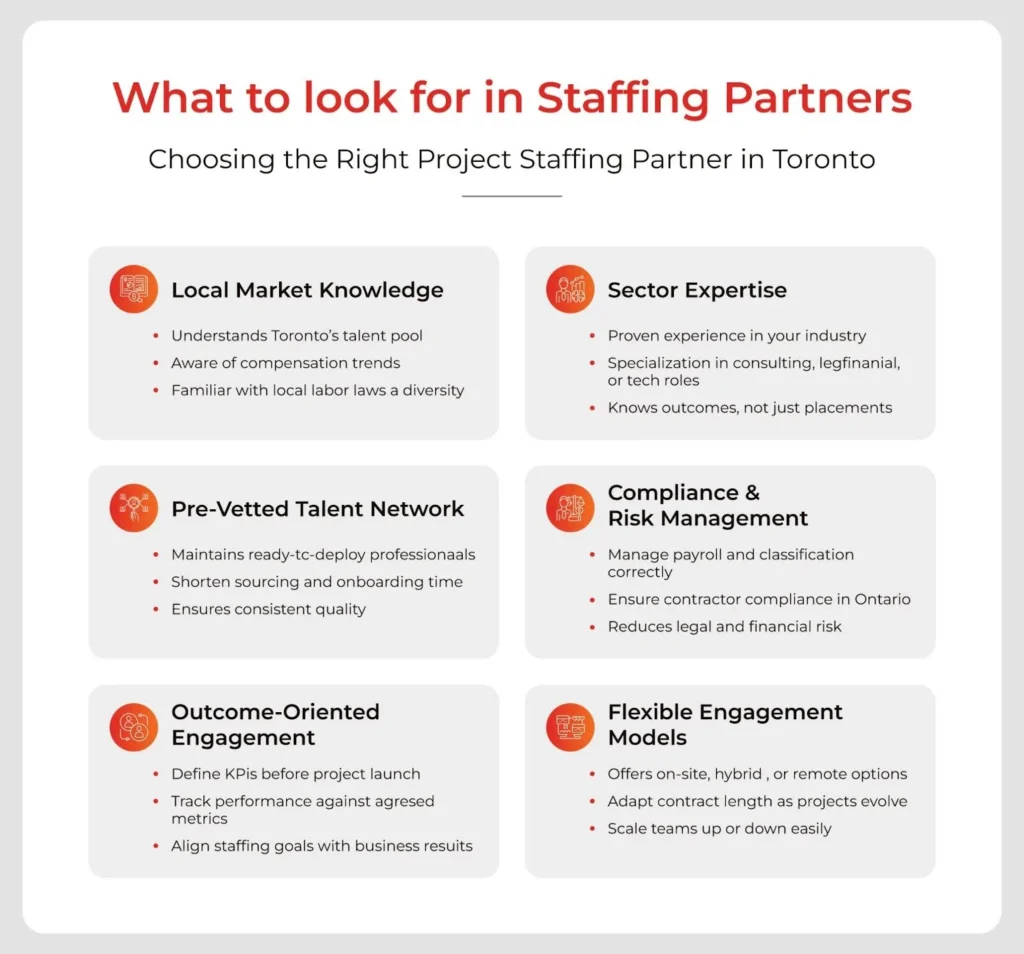Toronto’s professional services sector is undergoing a quiet but powerful transformation. Once defined by long-term client retainers and stable project cycles, it now operates in an environment where agility and speed determine survival. The rise of emerging industries, from fintech to the city’s fast-growing climate tech ecosystem, has only intensified this shift. Consulting, legal, financial, and IT-enabled service firms across the city are facing simultaneous pressures; clients expect faster delivery, regulatory requirements keep evolving, and specialized talent is harder to retain.
This shift has created a fundamental question for leaders: how do you deliver complex projects on time, without locking yourself into fixed headcount or inflated costs? The answer many Toronto firms are discovering lies in project staffing, a flexible, skill-on-demand model that allows organizations to scale their teams precisely when and where they’re needed.
Project staffing means building agile project ecosystems where the right professionals join, deliver, and transition seamlessly as business needs evolve. Whether it’s a six-month cloud migration, a short-term compliance engagement, or a multi-year digital transformation, this model helps firms align talent to timelines and ambition to opportunity.
As Toronto continues to position itself as one of North America’s top hubs for professional services, understanding how project staffing solutions fuel this ecosystem becomes essential.
Let us look at what project staffing really means, why it’s reshaping Toronto’s business landscape, and how firms can make it a long-term competitive advantage.
Understanding Project Staffing — A Smarter Way to Build Agile Teams
Wondering what is project staffing? It may sound like another HR phrase, but in practical terms, it means engaging talent on a finite, project-based mandate rather than hiring full-time permanent staff. A firm in Toronto may bring in a team or an individual specialist to deliver a defined endpoint, say a regulatory compliance audit, a digital transformation initiative, or a major client engagement.
This approach differs from traditional hiring in three ways:
- Time-bound scope: the role has a defined start and end.
- Specialist mandate: the talent often brings niche or hard-to-find expertise.
- Variable commitment: the firm isn’t locked into long-term headcount.
By thinking of staffing as a resource that flexes with demand, firms in Toronto’s professional services sector gain agility, cost control, and a sharper focus on outcomes.
Also read: When Should Companies Opt for Project-Based Staffing Services
Why Toronto Firms Are Turning to Project Staffing
In Toronto’s professional services ecosystem (law, consulting, audit, advisory, IT-enabled services), firms increasingly face:
- Accelerating project complexity (multiple stakeholders, tighter timelines)
- Skills scarcity in niche disciplines (data governance, ESG reporting, digital risk)
- Seasonal or cyclical workload spikes (tax filings, regulatory windows, RFP-driven engagements)
- Cost pressures from clients demanding efficiency and faster delivery
Project staffing offers direct responses to these pressures. When you need a high-end consultant for six months or a project manager for a defined migration, you don’t want the overhead of a full hire. You want access to someone ready to mobilize. A Toronto-based staffing partner with deep local networks can deliver that.
Moreover, local labour market dynamics matter. Toronto is a bilingual, multicultural city with cross-border flows, demanding regulatory complexity, and high cost of talent. Having a staffing model that aligns with project reality gives you both control and flexibility.
Key Advantages Project Staffing Offers
Below are some project staffing benefits:
Rapid access to niche or hard-to-find expertise
When a firm needs, say, a digital risk lead with Ontario regulatory experience plus cloud transformation chops, waiting six months for a permanent hire may cost hundreds of thousands in lost revenue. Using project staffing means you plug in that skill-set now.
Scale to match workload fluctuations
Project work in professional services is rarely steady. A spike in regulatory audits, an RFP win, or a big transformation can require 10s of consultants for 3-9 months. Project staffing allows you to ramp up, then wind down, without the fixed cost of permanent hires. This model supports cost discipline and operational agility.
Cost-effective delivery and time to value
By engaging project-staffed talent, you shift risk. You pay for outcomes rather than the full employment lifecycle. Delivery speed improves because the talent is pre-vetted, used to project-mode work, and can hit ground running.
Enhances strategic focus
When your core team isn’t stretched by delivery overload, they can focus on relationship building, strategic direction and business development. Project-staffed professionals handle the execution-intensive parts. That strategic/operational split often distinguishes firms that scale sustainably.
The Roles Most Suited to Project Staffing in Toronto
Typical roles within the Toronto professional services sector that align well with project staffing include:
- Project or programme managers (especially for transformation or advisory programmes)
- Business analysts and change managers requiring sector/regulation familiarity
- Risk, compliance and governance specialists (e.g., ESG reporting, data privacy)
- IT transformation leads or cloud migration consultants
- Interim leadership or subject matter experts brought in for discrete mandates
Such roles require both immediate ramp-up and domain fluency, making them ideal candidates for project staffing rather than permanent hire.
Choosing the right project staffing partner in Toronto

Choosing a partner for project-based talent is just as critical as picking the talent itself. Here are key criteria when engaging a staffing agency in Toronto.
- Local market knowledge: They understand Toronto’s talent pools, compensation norms, regulatory requirements and multicultural workforce dynamics.
- Depth in your sector: Select a partner experienced in your niche ,e.g., legal advisory, management consulting, financial services, not just general staffing.
- Project-mode mindset: Ensure the partner understands project timelines, deliverables, milestones, budget discipline and isn’t simply matching jobs to candidates.
- Network of pre-vetted talent: The partner should have a standby network of professionals ready for deployment, reducing lead time.
- Compliance and risk management: Particularly in Ontario and Canadian context — classification, payroll, contractor compliance must be managed.
- Outcome-oriented engagement: Define clear KPIs for the mandate, ensuring the staffing partner and you are aligned on what “success” looks like.
- Flexibility in engagement models: Whether on-site/hybrid/remote, contract length, scaling up/down should be flexible.
Selecting the right partner allows your firm in Toronto to leverage project staffing as a strategic enabler, rather than a tactical stop-gap.
Building Agility and Managing Seasonal Demand Through Project Staffing in Toronto
Project staffing in Toronto is especially effective for handling workload surges, seasonal peaks, and one-off transformation programs. Professional services firms across law, consulting, and technology often experience cyclical demand driven by tax season audits, fiscal year-end reporting, and compliance deadlines. Instead of maintaining excess headcount year-round, they can scale up with project-based teams to meet demand, then scale down once delivery is complete. This model aligns operating costs with revenue cycles while maintaining consistent service quality.
At its core, agile project staffing is a shift from static headcount to dynamic team composition. Toronto firms are no longer filling isolated vacancies; they are assembling specialized teams for defined sprints and measurable outcomes. For example, a firm may deploy a dedicated data-governance project team for six months rather than hiring a permanent portfolio manager. Once the project concludes, that team can transition off-board, leaving the organization lean and ready for its next engagement.
The rise of agile frameworks in Toronto’s professional ecosystem (from iterative consulting engagements to cross-functional digital projects) demands a workforce that can pivot just as quickly. Project staffing provides workforce elasticity: a model that’s ready to mobilize, deliver, disband, and redeploy without friction. In doing so, it gives Toronto’s professional services firms the operational agility needed to stay competitive in a constantly shifting market.
To Conclude
If your firm in Toronto treats project staffing as a stop-gap measure, you’re missing its strategic potential. Properly leveraged, project staffing becomes a growth engine, enabling rapid deployment of expertise, matching capacity to demand, and freeing your core team to focus on client relationships and value creation.
Here are actionable next steps to cement project staffing in your Toronto business model:
- Map your major upcoming project cycles (regulatory, digital transformation, client mandates) and assess if your current permanent headcount can flex.
- Identify the skill gaps in those projects (niche data risk? ESG compliance? cloud migration?).
- Engage a partner in Toronto that understands project-based staffing (not just general recruitment) and ensure you define outcomes, metrics, and an exit strategy.
- Design your resource model: consider how your organization will integrate project-staffed roles, manage onboarding, alignment to firm culture, and knowledge transfer post-project.
- Monitor outcomes: Did time-to-value shorten? Did the cost per delivered project reduce? Did your team maintain client focus?
In the evolving professional services landscape of Toronto, where speed, expertise and flexibility are key, project staffing is a strategic lever. If you align your model to project-based staffing thoughtfully, you position your firm to respond smarter, deliver stronger, and grow sustainably.
SPECTRAFORCE’s project-based recruiting and staffing services are designed for precision: you get the right people, at the right time, for the right duration, reducing cost and accelerating delivery without compromising quality.
Contact SPECTRAFORCE today to explore tailored project staffing services in Toronto and build your next high-performing team.
FAQs
Project staffing enables access to niche or hard-to-find expertise by allowing firms to tap into specialists for defined mandates without the long-term commitments of full-time hires. The staffing partner maintains a network of consultants who bring specific domain knowledge (e.g., digital risk, ESG, cloud migration), ready to deploy.
The types of professional roles commonly filled through project staffing in Toronto include project- and programme-managers, business analysts, compliance/risk specialists, IT transformation leads, change managers, and interim subject-matter experts brought in for discrete mandates.
Yes. Project staffing in Toronto can help firms manage seasonal or fluctuating workloads by enabling them to ramp up for high-demand periods or one-off engagements, then scale back when the workload returns to baseline, aligning cost to demand and preserving agility.
To choose the right project staffing partner in Toronto, evaluate their local market knowledge, sector-specific experience, network of pre-vetted talent, compliance capabilities, flexibility in engagement models, and whether they adopt a project-mode mindset focused on outcomes rather than simply filling roles.



